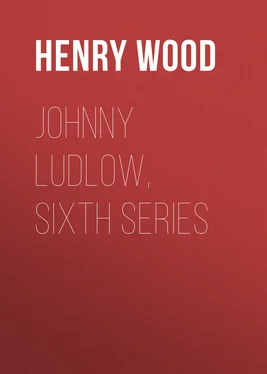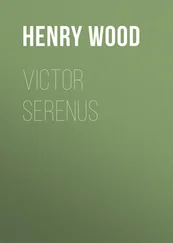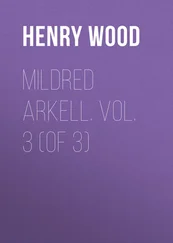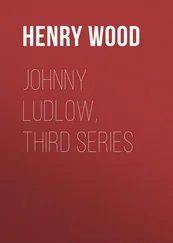Henry Wood - Johnny Ludlow, Sixth Series
Здесь есть возможность читать онлайн «Henry Wood - Johnny Ludlow, Sixth Series» — ознакомительный отрывок электронной книги совершенно бесплатно, а после прочтения отрывка купить полную версию. В некоторых случаях можно слушать аудио, скачать через торрент в формате fb2 и присутствует краткое содержание. Жанр: foreign_prose, literature_19, foreign_antique, на английском языке. Описание произведения, (предисловие) а так же отзывы посетителей доступны на портале библиотеки ЛибКат.
- Название:Johnny Ludlow, Sixth Series
- Автор:
- Жанр:
- Год:неизвестен
- ISBN:нет данных
- Рейтинг книги:5 / 5. Голосов: 1
-
Избранное:Добавить в избранное
- Отзывы:
-
Ваша оценка:
- 100
- 1
- 2
- 3
- 4
- 5
Johnny Ludlow, Sixth Series: краткое содержание, описание и аннотация
Предлагаем к чтению аннотацию, описание, краткое содержание или предисловие (зависит от того, что написал сам автор книги «Johnny Ludlow, Sixth Series»). Если вы не нашли необходимую информацию о книге — напишите в комментариях, мы постараемся отыскать её.
Johnny Ludlow, Sixth Series — читать онлайн ознакомительный отрывок
Ниже представлен текст книги, разбитый по страницам. Система сохранения места последней прочитанной страницы, позволяет с удобством читать онлайн бесплатно книгу «Johnny Ludlow, Sixth Series», без необходимости каждый раз заново искать на чём Вы остановились. Поставьте закладку, и сможете в любой момент перейти на страницу, на которой закончили чтение.
Интервал:
Закладка:
“But you like Miss Deveen?”
“Very much indeed, sir; she is a good lady and a kind mistress. She spoke very well indeed of me to the new family where I am going, and I daresay I shall do well enough there.—Have you been to Saltwater lately, sir?” she added, abruptly.
“Never since. Do you get news from the place?”
She shook her head. “I have never heard a word from any soul in it. I have written to nobody, and nobody has written to me.”
“And nothing more has come out about poor Jane Cross. It is still a mystery.”
“And likely to be one,” she replied, in a low tone.
“Perhaps so. Do you know what Owen the milkman thought?”
She had spoken the last sentence or two with her eyes bent, fiddling with the silver waiter. Now they were raised quickly.
“Owen thought that you could clear up the mystery if you liked, Matilda. At least, that you possessed some clue to it. He told me so.”
“Owen as good as said the same to me before I left,” she replied, after a pause. “He is wrong, sir: but he must think it if he will. Is he—is he at Saltwater still?”
“For all I know to the contrary. This letter, that the servants here got at, was one you were beginning to write to Owen. Did–”
“I would rather not talk of that letter, Mr. Johnny: my private affairs concern myself only,” she interrupted—and went out of the room like a shot.
Had anyone told me that during this short visit of mine in London I should come across the solution of the mystery of that tragedy enacted at No. 7, I might have been slow to credit it. Nevertheless, it was to be so.
Have you ever noticed, in going through life, that events seem to carry a sequence in themselves almost as though they bore in their own hands the guiding thread that connects them from beginning to end? For a time this thread will seem to be lost; to lie dormant, as though it had snapped, and the course of affairs it was holding to have disappeared for good. But lo! up peeps a little end when least expected, and we catch hold of it, and soon it grows into a handful; and what we had thought lost is again full of activity and gradually works itself out. Not a single syllable, good or bad, had we heard of that calamity at Saltwater during the fourteen months which had passed since. The thread of it lay dormant. At Miss Deveen’s it began to steal up again: Matilda, and her passion, and the letter she had commenced to Thomas Owen were to the fore: and before that visit of mine came to an end, the thread had, strange to say, unwound itself.
I was a favourite of Miss Deveen’s: you may have gathered that from past papers. One day, when she was going shopping, she asked me to accompany her and not Miss Cattledon: which made that rejected lady’s face all the more like vinegar. So we set off in the carriage.
“Are we going to Regent Street, Miss Deveen?”
“Not to-day, Johnny. I like to encourage my neighbouring tradespeople, and shall buy my new silk here. We have excellent shops not far off.”
After a few intricate turnings and windings, the carriage stopped before a large linendraper’s, which stood amidst a colony of shops nearly a mile from Miss Deveen’s. George came round to open the door.
“Now what will you do, Johnny?” said Miss Deveen. “I daresay I shall be half an hour in here, looking at silks and calico; and I won’t inflict that penalty on you. Shall the carriage take you for a short drive the while, or will you wait in it?—or walk about?”
“I will wait in the street here,” I said, “and come in to you when I am tired. I like looking at shops.” And I do like it.
The next shop to the linendraper’s was a carver and gilder’s: he had some good pictures displayed in his window; at any rate, they looked good to me: and there I took up my station to begin with.
“How do you do, sir? Have you forgotten me?”
The words came from a young man who stood at the next door, close to me, causing me to turn quickly to him from gazing at the pictures. No, I had not forgotten him. I knew him instantly. It was Owen, the milkman.
After a few words had passed, I went inside. It was a large shop, well fitted up with cans and things pertaining to a milkman’s business. The window-board was prettily set off with moss, ferns, a bowl containing gold and silver fish, a miniature fountain, and a rush basket of fresh eggs. Over the door was his own name, Thomas Owen.
“You are living here, Owen?”
“Yes, sir.”
“But why have you left Saltwater?”
“Because, Mr. Johnny, the place looked askance at me. People, in their own minds, set down that miserable affair at No. 7 to my credit. Once or twice I was hooted at by the street boys, asking what I had done with Jane Cross. My mother couldn’t stand that, and I couldn’t stand it, so we just sold our business at Saltwater, and bought this one here. And a good change it has been, in a pecuniary point of view: this is an excellent connection, and grows larger every day.”
“I’m sure I am glad to hear it.”
“At first, mother couldn’t bear London: she longed for the country air and the green fields: but she is reconciled to it now. Perhaps she’ll have an opportunity soon of going back to see her own old Welsh mountains, and of staying there if it pleases her.”
“Then I should say you are going to be married, Owen.”
He laughed and nodded. “You’ll wish me good luck, won’t you, sir? She’s the only daughter at the next door, the grocer’s.”
“That I will. Have you discovered anymore of that mysterious business, Owen?”
“At Saltwater? No, sir: not anything at all that could touch the matter itself. But I have heard a good bit that bears upon it.”
“Do you still suspect that Matilda could tell if she chose?”
“I suspect more than that, sir.”
The man’s words were curiously significant. He had a bit of fern in his hand, and his fresh, open, intelligent face was bent downwards, as if he wanted to see what the leaf was made of.
“I am not sure, sir. It is but suspicion at the best: but it’s an uncommonly strong one.”
“Won’t you tell me what you mean? You may trust me.”
“Yes, I am sure I may,” he said, promptly. “And I think I will tell you—though I have never breathed it to mortal yet. I think Matilda did it herself.”
Backing away from the counter in my surprise, I upset an empty milk-can.
“Matilda!” I exclaimed, picking up the can.
“Mr. Johnny, with all my heart I believe it to have been so. I have believed it for some time now.”
“But the girls were too friendly to harm one another. I remember you said so yourself, Owen.”
“And I thought so then, sir. No suspicion of Matilda had occurred to me, but rather of the man I had seen there on the Wednesday. I think she must have done it in a sudden passion; not of deliberate purpose.”
“But now, what are your reasons?”
“I told you, sir, as I daresay you can recall to mind, that I should do what lay in my power to unravel the mystery—for it was not at all agreeable to have it laid at my door. I began, naturally, with tracing out the doings of that night as connected with No. 7. Poor Jane Cross had not been out of doors that night, and so far as I knew had spoken to no one save to me from the window; therefore of her there seemed nothing to be traced: but of Matilda there was. Inquiring here and there, I bit by bit got a few odds and ends of facts together. I traced out the exact time, almost to a minute, that I rang twice at the door-bell at No. 7, and was not answered; and the time that Matilda entered the Swan to get the supper beer. Pretty nearly half an hour had elapsed between the first time and the second.”
“Half an hour!”
Читать дальшеИнтервал:
Закладка:
Похожие книги на «Johnny Ludlow, Sixth Series»
Представляем Вашему вниманию похожие книги на «Johnny Ludlow, Sixth Series» списком для выбора. Мы отобрали схожую по названию и смыслу литературу в надежде предоставить читателям больше вариантов отыскать новые, интересные, ещё непрочитанные произведения.
Обсуждение, отзывы о книге «Johnny Ludlow, Sixth Series» и просто собственные мнения читателей. Оставьте ваши комментарии, напишите, что Вы думаете о произведении, его смысле или главных героях. Укажите что конкретно понравилось, а что нет, и почему Вы так считаете.












